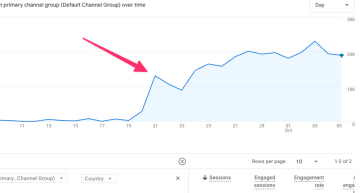
What Performance-Based SEO Is And Is Not.
Quick Summary of Contents
- 1 Article syndication sounds good, but is not performance-based SEO.
- 2 The over optimization of anchor text.
- 3 Purchasing thin content and spun content stuffed with keywords.
- 4 Keyword stuffing like it’s a Thanksgiving Turkey.
- 5 Comment spamming forums and blogs is not performance-based SEO.
- 6 Submitting your website to every web directory known to man.
- 7 Fake social signals are make-believe.
- 8 Performance-based SEO is not buying backlinks.
- 9 Excessive cloaking and doorway pages to excessive search penalties.
- 10 Excessive internal linking will not be tolerated by search engines.
 What is considered performance-based SEO? There is much talk about pay for performance search engine optimization (SEO), also known as performance-based SEO. What it is and what it is not.
What is considered performance-based SEO? There is much talk about pay for performance search engine optimization (SEO), also known as performance-based SEO. What it is and what it is not.
Today I want to outline and discuss what performance-based SEO is not in comparison to true and authentic white-hat, performance-based SEO.
I aim to help you identify the disadvantages of deceptive performance-based SEO.
We’ll identify, comprehend, and understand what to be on the lookout for when SEO companies or consultants try to pass gray-hat or black-hat SEO as performance-based SEO services.
Article syndication is one of the most overrated services pushed as performance-based SEO by SEO companies and professionals looking to make a quick dollar.
Essentially, SEOs take the content you created or will create in the future and repost the content to other websites.
Sometimes the other websites are topically off-based and irrelevant to the content you’ve worked diligently to create.
The problem with other websites hosting your content is that Google looks for unique content from one website.
If the content you create is not associated with your website first, then you lose from an SEO standpoint.
This is why article syndication can be downright damaging to a company’s SEO efforts if their content is not seen or associated with their domain as unique by Google and other search engines.
In addition, sometimes article syndication is passed as deceptive guest blogging too.
My advice on article syndication is to publish the content on your website first and wait a period of 30-45 days before syndicating it elsewhere throughout the web.
The over optimization of anchor text.
The over-optimization of anchor text can definitely anchor your search engines in a negative manner.
Over-optimization of anchor text can occur using the same anchor text and URL as a link over again on the same page or domain multiple times.
This is yet another deceptive link-building scheme that is passed as performance-based SEO when it is strictly black-hat SEO.
In short, I offer the advice of mixing up the variations of anchor text and URL links to avoid over-optimization of anchor text search engine penalties.
Purchasing thin content and spun content stuffed with keywords.
If SEO professionals or companies ever tell you that they are going to curate content and provide you with a trove of industry-specific articles that are 500 words or less, then you are purchasing nothing more than thin content and/or spun content.
Thin and spun content can be created by purchasing software designed to programmatically generate content based on a keyword, or via article buying and submission services.
This content is usually chocked full of grammar, syntax, and spelling errors, and typically leads to severe Panda, and search engine penalties and sometimes de-indexation.
Many times thin content is nothing more than keyword-laden content passed to different customers repeatedly as performance-based SEO services.
Real performance-based SEO services are based on sound content marketing that can stand on its own without deceptive SEO gimmicks and tactics.
Keyword stuffing like it’s a Thanksgiving Turkey.
 Keyword stuffing does work in regards to getting your website high search rankings, but not sustaining the rankings.
Keyword stuffing does work in regards to getting your website high search rankings, but not sustaining the rankings.
Many times, keyword stuffing is considered performance-based SEO because of the quick turnaround in inflated search rankings.
Keyword stuffing is not only saturating content with visible keywords in the text, but it is also stuffing keywords into content and making the font color of the keywords the same as the background.
To the unsuspecting user of the website, they’ll never know the difference or see the text, whereas the search engines will graciously grant the website with inflated rankings until caught by an algorithm update.
Other deceptive keyword-stuffing tactics and strategies are using keyword-laden URLs, hidden files, meta tags, file names, and site-wide footer links.
Comment spamming forums and blogs is not performance-based SEO.
One of the most abused and deceptive SEO tactics is selling customers’ blog and forum comments to give the appearance of increased traffic and to game search engine rankings.
Most forum and blog comments that are considered spam use keywords and links instead of real people’s names and relevant website URLs.
Many times customers that pay for so-called 24-72 hour turnaround “qualified profile commenting” or “high-quality comments” are paying for nothing more than automated spam techniques that leave useless comments on low-quality websites.
Forum and blog commenting using keywords as the profile name, also known as comment spamming or spamdexing, is often sold as a performance-based SEO and is nowhere close to being considered sound SEO. Yes, it works, but only until search engines penalize and possibly de-index your website.
Submitting your website to every web directory known to man.
If any SEO professional or agency prides itself based on directory submission, they are out to only pull the wool over your eyes and make a quick dollar off your business.
Most of the time, SEOs touting directory submission as performance-based SEO are doing nothing more than adding a surcharge to the directory submission services of another company.
They don’t know this company’s process nor where your website is being submitted to.
Truth be told, with a little diligence, you can submit your website to relevant directories for a fraction of the cost and headache long term.
Take your time to understand the directory and whether or not your website is relevant to be listed in the directory.
The worst thing you can do is associate your website with another low-quality backlink profile known for paid link services.
 Have you ever paid for Twitter followers, Twitter Re-tweets, Instagram followers, Facebook likes, Facebook Comments, YouTube comments, and YouTube views from a 3rd party social media service provider?
Have you ever paid for Twitter followers, Twitter Re-tweets, Instagram followers, Facebook likes, Facebook Comments, YouTube comments, and YouTube views from a 3rd party social media service provider?
If so, then you have knowingly or unknowingly fallen for the social media signal services propped up as performance-based SEO.
Unfortunately, fake social signals are deceptive because you are gaming search engines in favor of higher rankings.
For social signals to be legit, you really need to spend the time, effort, and money to advertise using the advertising services of the respective social media platform.
Fake social signals are just that, fake.
They are typically generated by fake social profiles or automated services that do nothing more than like, follower, comment, and view as they’re programmed to.
Performance-based SEO is not buying backlinks.
If you are ever approached or it is suggested that you buy links or participate in paid backlink services, then run to the hills and fast. Paying for links period is not performance-based SEO.
Buying links unleashes every Penguin known to man against your website. Sometimes buying paid links is advertised as high page rank (PR) links or links from websites with a PR greater than three (2).
One of the biggest problems with paid backlink services being peddled as performance-based SEO services is that the links can disappear without you, the customer, ever noticing.
Some paid backlink services will remove links after 30, 60, 90, or more days, causing your website to lose search rankings and a lower backlink count.
Then to obtain the SEO ground you lost via disappearing paid backlinks, you have to pay for them again and this is a neverending circle of profit for paid backlink service providers.
In short, stop buying links that waste your money and cost you in time, effort, money, and rankings.
Stop buying links and losing rankings, and start creating search engine-safe content that your customers share naturally, which increases your relevant organic backlink and search rankings in search engines.
Excessive cloaking and doorway pages to excessive search penalties.
If you get into a conversation about redirects or using iframes, you are headed towards cloaking and doorway pages and a mound of SEO penalties.
 Many times, SEOs will try to pass cloaking and doorway pages as white-hat landing pages that happen to redirect users or search engine bots to another page that is not the same for either.
Many times, SEOs will try to pass cloaking and doorway pages as white-hat landing pages that happen to redirect users or search engine bots to another page that is not the same for either.
Deceptive SEOs typically use tricky javascript, php or asp redirects, ip address comparison, or even use hyperlinked text to pages that redirect using meta tags.
Advanced cloaking, or ip address comparison, presents search engine bots with one page of content and users with another page of content, which severely penalizes a website.
Many search engines penalize websites that deceptively use redirects other than 301 or 302 redirects.
Limit the discussion of search engine bot redirections and deceptive landing pages used to increase search rankings to zero (0).
This will help you to avoid search penalties both short and long-term.
Excessive internal linking will not be tolerated by search engines.
Excessive internal linking was once the thing done to skyrocket a website’s search rankings and backlink profile to the first page of search engines.
Many SEOs added this internal linking strategy to their toolboxes and started peddling it as performance-based SEO.
It did bring positive results, that is until search engines cracked down on such deceptive SEO behavior.
Excessive internal linking can be categorized as site-wide footer links, stuffing navigation with useless links, and creating pages with nothing more than a long list of links to other pages.
Participating in excessive internal linking is brutal to one’s search rankings.
To avoid search engines’ excessive internal linking penalties, a good rule of thumb is to limit the number of links on a page to fewer than 100 links.















Thank you SEO guidance.